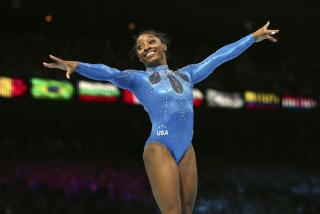BARCELONA ’92 OLYMPICS / DAY 6 : Substitutes Not New to Gymnastics
- Share via
When Tatiana Gutsu replaced teammate Rozalia Galieva in the all-around final Thursday, it conjured up memories of another time when the then-Soviet team replaced an injured gymnast and won the gold medal with the substitute.
At the 1985 World Championships at Montreal, Yelena Shoushounova, then the Soviets’ rising star, fell off the bars twice in the team compulsory exercises and did not advance to the all-around competition.
“But the Soviets wanted to showcase Shoushounova and Oksana Omeliantchik for the 1988 Olympics, they were the young stars and really hot,” said Don Peters of SCATS Gymnastics, who was the coach of the U.S. team.
“Omeliantchik finished in the top three, but Shoushounova didn’t. So they bumped Olga Mostepanova and said she was hurt. Well, I can’t speak to whether (Galieva) was hurt or not, but I know Mostepanova wasn’t. We trained in the same gym in Montreal and she wasn’t hurt, but she was very, very angry. “
Only the top 36 individuals after the team competition qualify for the all-around, with no more than three from one country. The only way a gymnast can be replaced is if she is injured, but the injury does not have to be proven. The replacement also has to finish in the top 36 in the team competition.
Shoushounova went on to tie teammate Omeliantchik for the gold medal--the first time there was a tie in meet history. Gutsu, too, won the gold medal.
Gutsu--the top young CIS star--fell off the beam during the team optionals and finished ninth behind eighth-place Galieva. Thursday, the Commonwealth of Independent States reported that Galieva had a knee injury and was being replaced by Gutsu.
“In Mostepanova’s case, she was a marvelous gymnast who had lost out at the ’84 Olympics because of the boycott,” Peters said. “This was her chance, and she was taken out.
“If an athlete is injured, then the rule is good. But if they aren’t injured, it stinks. It’s like the individual has no rights. These kids legitimately qualified. How can you do that to an athlete?”
Mostepanova, then 17, had scored a 10 on the balance beam and was the leading scorer after team compulsories, even beating the favored Olympic silver-medalist Ecaterina Szabo of Romania. Szabo had lost the gold medal to Mary Lou Retton in 1984 when Retton scored a 10 on her final event, the vault.
Shoushounova went on to win the gold medal in the 1988 Olympics, beating out Romania’s Daniela Silivas by scoring a 10 on her final event--the vault.
More to Read
Go beyond the scoreboard
Get the latest on L.A.'s teams in the daily Sports Report newsletter.
You may occasionally receive promotional content from the Los Angeles Times.






